The trucking industry is a vital part of the economy that most people undervalue as a job.
Businesses of all sizes depend on the trucking industry to maintain fast delivery times and deliver products safely all over the nation.
While driving a commercial truck, you can feel great knowing that your job plays an essential role in the lives of millions of people and business owners.
1. Truckers deliver products
The trucking industry makes its first economic contribution through the delivery of raw materials to various manufacturers all over the United States.
Truck drivers haul food, liquids, products for retail, and construction materials, and these are the most popular products carried by trucks.
A trucking business may specialize in what it hauls.
Some trucking businesses move people’s households, tanks and weapons for the military or heavy equipment like huge bulldozers and cranes.
Some have armed guards aboard their trucks while taking irreplaceable art and sculptures to museums.
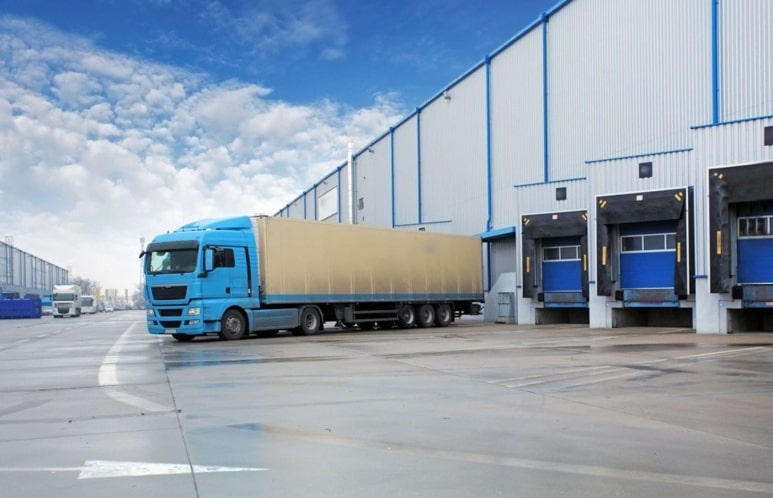
75-percent of everything in America is delivered by truck.
According to the American Trucking Association in just one day without truck drivers, hospitals would begin running out of basic supplies; service stations would begin to run out of fuel; food shortages would rise; the normal life would be totally disabled.
2. Corona virus pandemic
During the corona virus pandemic, millions of Americans were told “stay home, save lives.”
While the entire country was shut down, just truckers kept the world moving.
Without the truck drivers – grocery stores shelves would’ve been empty, ATMs would’ve been empty, hospitals were stocked multiple times a day with fresh equipment.
Many drivers have put their lives on the lines during the pandemic, risking their lives and lives of their families.
Truckers have reduced interaction with people, but they had to interact with the general public as well as handle potentially contaminated boxes and other freight.
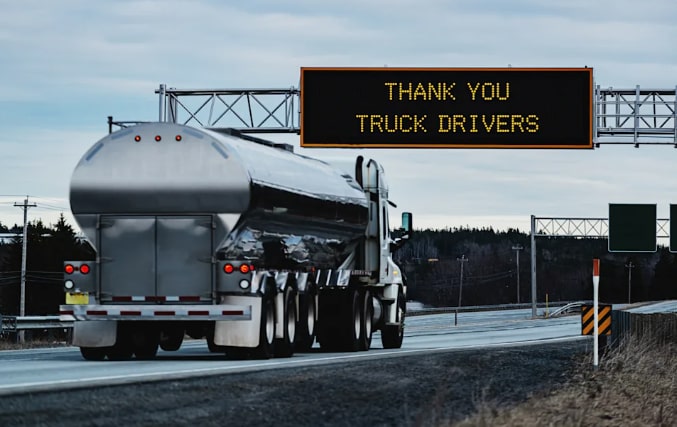
Changes have been made with shipping and receiving.
Many drivers went through extensive screening before entering a building. They were asked questions about where they have been, who they have been around, illness symptoms, and so on.
One essential feature of truck drivers’ lives, the truck stop, has been also impacted. Similar to restaurants and bars, truck stops across the country have been shut down to prevent the gathering of large groups of people. Truck stops are one of the few places along the highway where truck drivers can pull over and get a good night’s sleep. Without them, truck drivers are forced to find parking lots large enough to accommodate them, which can be difficult to do.
Like the rest of the world, they also needed to get used to the new reality wearing masks, gloves and using hand sanitizer.
3. Truckers are large workforce.
There are over 3.6 million truck drivers working in the US.
Overall, a total of 7.4 million Americans have jobs tied to the trucking industry.
Further reading: 15 Facts About Trucking [INFOGRAPHIC]
These four occupations (heavy-duty, light-duty, and delivery truck drivers; school bus drivers; and driver/sales workers) employ 3.6 million workers and account for 35.7 percent of total transportation-related employment.
As stated by the American Trucking Association, there is a large shortage of good drivers and anyone who gets into truck driving can count on being in demand and having a secure future.
The number of Truck Drivers is expected to grow much faster than average growth rate for all occupations.
Jobs for are expected to increase by 15.2 percent, or 24,400 jobs between 2018 and 2028.

There are currently around 52,000 driver vacancies within the trucking industry, nationwide.
The freight volume is also expected to increase in the next years. The American Trucking Associations (ATA) estimates the freight volume is expected to grow by 2.3% in between of 2024-2028.
This shows a continued increase, not just in the need for drivers.
There are small trucking businesses that operate in the owner operator model and big trucking companies who hire lots of drivers.
The truck driving industry is continually growing, and trucking employment has provided a stable income to many workers of different ages.
4. Truckers connect businesses
The business of moving freight is all about connection.
The connection between shipper and carrier, between driver and vehicle, between technician and engine — all of these are critical. This industry is competitive. Customers have numerous operators to choose from, including privately held carriers and companies outside the industry, such as air-transporters.
As a result, day-to-day operations tend to be relationship-oriented. Companies strive to build close ties with customers in order to generate repeat business. Providing excellent service is a necessity, since customers can easily find an alternative shipper.
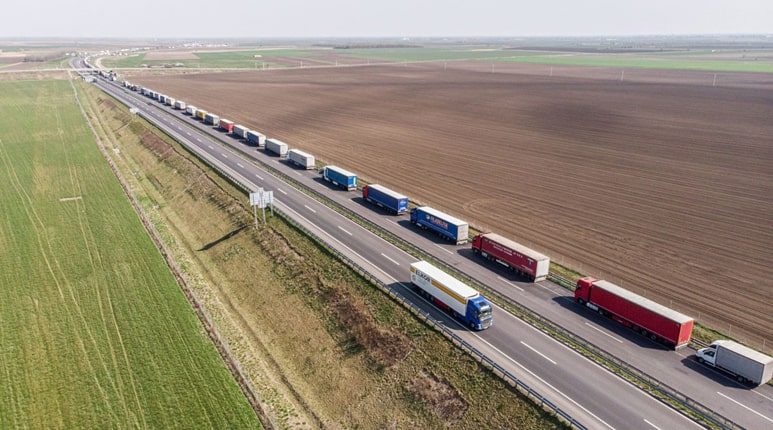
Trucking is an industry made up of small businesses. According to the Federal Motor Carrier Safety Administration (FMCSA) there were 493,730 trucking companies operating in the United States in 2016.
When more trucks are moving and freight rates are rising, that means consumers are spending more, and retailers and manufacturers are adding to their inventories.
5. Truckers fight against human trafficking
Human trafficking exists whenever people are bought and sold for forced labor or commercial sex.
It’s also called “modern slavery”.
Because traffickers often exploit the transportation system to move their victims across the country, truckers are at an advantage in spotting signs and making reports.
The trucking industry is composed of people already entrusted with caring for other people’s goods, which speaks to the character of the industry when it comes to caring for others — especially when the interest of others might be in trouble.
There are several “red flags” that can help truck driver’s spot victims.
Always take a closer look into the faces and activities at truck stops, highway motels and rest areas across the country which reveals the victimization of countless women, men and even children.
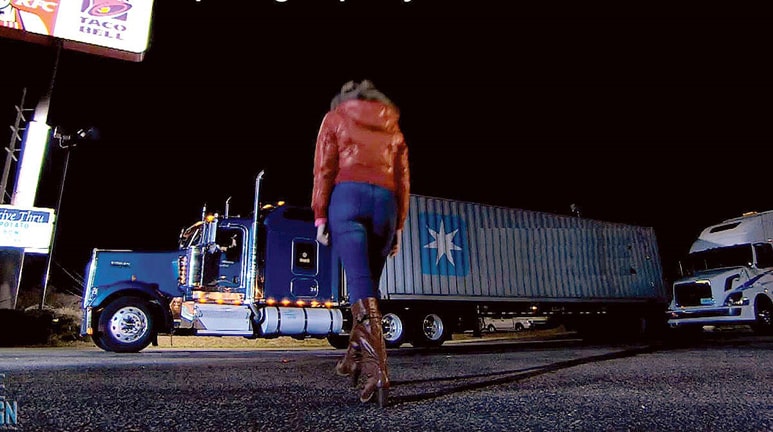
TAT (Truckers against trafficking) wanted to educate drivers and equip them with tools which can help them to quick mobilize against this crime.
They used tolls such as informational website, on-demand webinars, a trucking-industry-specific training DVD, wallet cards with signs to look for and questions to ask, and social media accounts.
To this date, more than 1,014,367 drivers and industry members have been registered as TAT Trained. If you want to be trained go to TAT Website https://truckersagainsttrafficking.org/
The latest numbers available from the National Human Trafficking Hotline show that as of mid -2020, truckers had made more than 2692 calls with 708 likely cases of trafficking, involving 1296 victims.
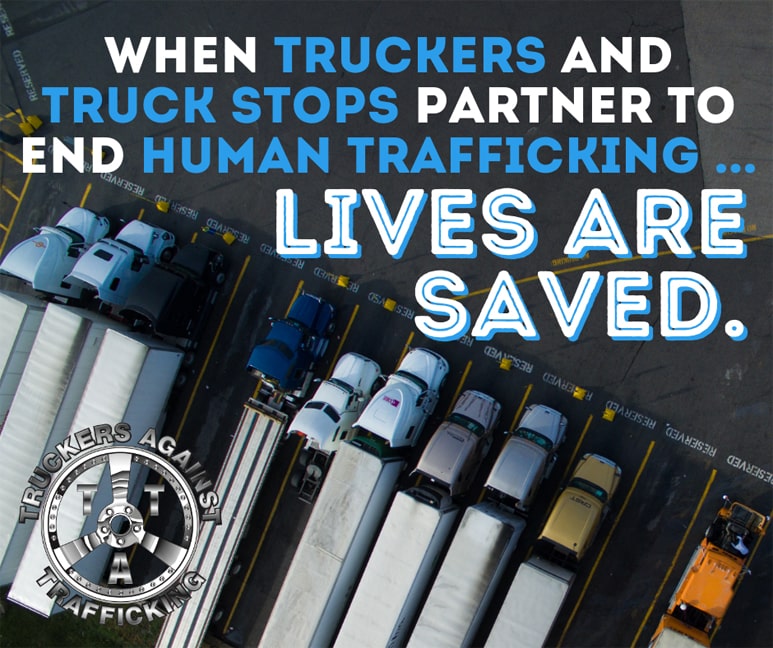
Members of the trucking, bus and energy industries are invaluable in the fight against this heinous crime.
They are the eyes and ears of our nation’s highways.
“If you are a victim of trafficking or know someone who is being trafficked, text or call the National Human Trafficking toll-free 24-hour hotline at 1-888-373-7888. If you suspect trafficking, contact your local police.”
Some heroes are easy to spot. They wear their uniforms; they are in the news, drive cars with sirens. But some heroes don`t wear uniforms. They are just doing their job and wouldn`t call themselves a hero.
Being a trucker is not an easy job. It demands a strong foundation, commitment to safety, devotion to service and periods of personal sacrifice. Many people do not realize just how important the truckers are as workforce. Without them life as we know it would not be the same.
More heroes are needed to join the lines and help keep America moving forward.



